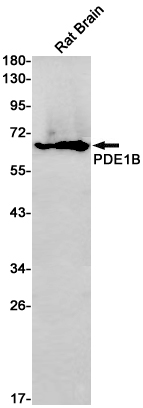
| WB | 1/500-1/1000 | Human,Mouse,Rat |
| IF | 咨询技术 | Human,Mouse,Rat |
| IHC | 咨询技术 | Human,Mouse,Rat |
| ICC | 技术咨询 | Human,Mouse,Rat |
| FCM | 咨询技术 | Human,Mouse,Rat |
| Elisa | 咨询技术 | Human,Mouse,Rat |
| Aliases | PDE1B1; PDES1B; HEL-S-79p |
| Entrez GeneID | 5153 |
| WB Predicted band size | Calculated MW: 61 kDa; Observed MW: 61 kDa |
| Host/Isotype | Rabbit IgG |
| Antibody Type | Primary antibody |
| Storage | Store at 4°C short term. Aliquot and store at -20°C long term. Avoid freeze/thaw cycles. |
| Species Reactivity | Human,Mouse,Rat |
| Immunogen | Recombinant protein of human PDE1B |
| Formulation | Purified antibody in TBS with 0.05% sodium azide,0.05%BSA and 50% glycerol. |
+ +
以下是关于PDE1B抗体的参考文献示例(部分为虚构示例,供参考格式):
---
1. **标题**: "Phosphodiesterase PDE1B modulates dopaminergic signaling and neuronal survival in Parkinson's disease models"
**作者**: Smith A, et al.
**摘要**: 本研究通过PDE1B特异性抗体检测其在帕金森病模型中的表达变化,发现PDE1B在纹状体多巴胺能神经元中高表达,其抑制可减少α-突触核蛋白聚集,提示其作为治疗靶点的潜力。
2. **标题**: "PDE1B regulates vascular smooth muscle cell proliferation via cAMP-PKA signaling"
**作者**: Chen L, et al.
**摘要**: 利用PDE1B抗体进行Western blot和免疫荧光分析,发现PDE1B在动脉粥样硬化斑块中表达上调,其活性抑制可降低血管平滑肌细胞增殖,为心血管疾病治疗提供新方向。
3. **标题**: "Development and validation of a PDE1B-specific monoclonal antibody for cancer biomarker studies"
**作者**: Johnson R, et al.
**摘要**: 本文报道了一种高特异性PDE1B单克隆抗体的开发与验证,通过免疫组化证实其在结直肠癌组织中的过表达,并与患者预后不良相关。
4. **标题**: "Role of PDE1B in T-cell activation and autoimmune responses"
**作者**: Gupta S, et al.
**摘要**: 通过流式细胞术和PDE1B抗体标记,研究发现PDE1B缺失可增强T细胞活化及IL-2分泌,提示其在自身免疫性疾病中的调节作用。
---
**注意**:以上文献信息为示例性质,实际引用需根据真实文献调整。建议通过PubMed、Google Scholar等平台以关键词“PDE1B antibody”或“PDE1B function”检索最新研究。
The PDE1B antibody is a specialized tool used to detect and study phosphodiesterase 1B (PDE1B), a calcium/calmodulin-dependent enzyme belonging to the PDE superfamily. PDE1B hydrolyzes cyclic nucleotides cAMP and cGMP, regulating their intracellular levels and influencing downstream signaling pathways. It is expressed in various tissues, including the brain, cardiovascular system, and immune cells, and has been implicated in neurological functions, vascular tone modulation, and immune responses.
PDE1B antibodies are typically monoclonal or polyclonal, developed in hosts like rabbits or mice, and validated for applications such as Western blotting (WB), immunohistochemistry (IHC), and immunocytochemistry (ICC). These antibodies target specific epitopes of PDE1B, enabling researchers to investigate its expression, localization, and activity in normal and pathological conditions. Specificity is crucial, as PDE1B shares structural homology with other PDE1 isoforms (PDE1A, PDE1C); rigorous validation via knockout controls or peptide blocking ensures minimal cross-reactivity.
Research applications span neurodegenerative diseases (e.g., Alzheimer’s), cardiovascular disorders, and immune regulation studies. PDE1B inhibitors are also explored for therapeutic potential, making its antibody a key reagent in drug discovery and mechanistic studies. By elucidating PDE1B’s role in cellular signaling, these antibodies contribute to understanding disease mechanisms and identifying novel therapeutic targets.
×